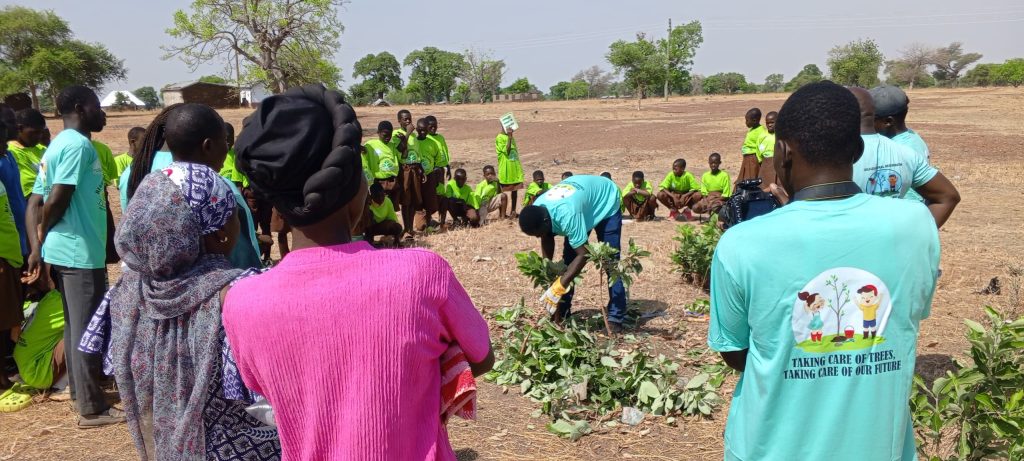By Gilbert Azeem Tiroog
Sakorit (U/E), April 10 GNA – The Forum for Natural Regeneration (FONAR), an environmental-focused non-governmental organisation, has inaugurated basic school kids’ Farmer Managed Natural Regeneration (FMNR) Eco-Clubs in the Talensi District of the Upper East Region.
The ceremony, which was followed by symbolic pruning of trees by FONAR staff, Eco Club teachers and members at the Sakorit Basic School, was held on the theme: “Taking Care of Trees, Taking Care of Our Future”.
The project is set to benefit 10 rural public basic schools in the district, and forms part of the Regreening Communities Through School Kids FMNR Eco-Clubs in Talensi District, Northern Ghana project, with funding support from the Heidehof Foundation of Germany and Aweaken Trees of Austria.
Mr Christopher Pubeng, a Programme Officer at FONAR, addressing the Eco-Club members and a host of Ghana Education Service staff at the ceremony, said the project aimed at empowering children and teachers to contribute actively to local landscape regreening actions.
“This two-year project, spanning from 2025 to 2026, is also aimed at increasing wider community awareness on the importance of trees and the need for sustaining FMNR practices for improved livelihoods, while expanding the coverage of FONAR’s innovative Talensi School Kids FMNR Eco-Clubs initiative in Northern Ghana,” he added.
Mr Sumaila Seidu Saaka, the Executive Director of FONAR, reiterated that the initiative was to build a squad of young FMNR champions who would advocate tree stewardship, environmental conservation, and the need to sustain FMNR practices in their communities.
He said the FMNR technique was simple, more appropriate, low-cost, low-risk, and offered high returns for quickly increasing tree cover and improving soil health and urged the schools and communities to embrace the initiative to restore degraded lands.
Mr Saaka said the FMNR initiative had been recognised by the European Union (EU) Sustainable Development Goals (SDGs) as a good practice for restoring nature and called on the government to consider including it as a priority land restoration strategy in the Trees for Life Initiative.

“To quickly restore degraded lands, particularly in Northern Ghana because of our peculiar harsh geographical location, the FMNR is less expensive compared to tree planting, has a very rapid, almost 100 percent tree survival rate, is easy to scale up and culturally sensitive” he emphasized.
Madam Rita Alemya, Headmistress of Sakorit Primary School, while expressing her gratitude for the initiative, noted that the project would regreen the schools and communities and also instill in the students the importance of FMNR practice.
Mr Silas Mahama, the Project Focal Person for FONAR, said the success of the project depended on the commitment of students and teachers and called on them to cooperate and show a sense of commitment in the implementation of the project.
Mr Robert Dormbiyeng, the School Management Committee Chairman of Sakorit Basic School, said the community was committed to giving the schools the needed support to succeed in
regreening the communities and urged the project coordinators to call on them when the need arose.
Mr Joseph Zida, the District Human Resource Person and representative of the District Education Director, lauded FONAR and its partners for the initiative and urged the schools to make the most of the eco-clubs by working hard to achieve the project objectives.
GNA
FAA/GRB